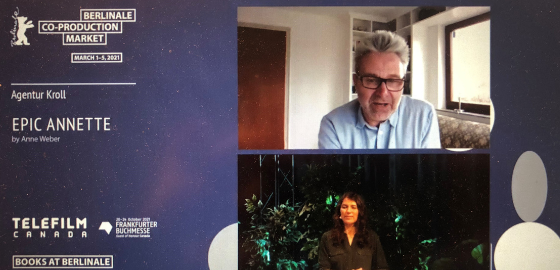“Plot, characters, theme, conflicts, a special point of view or possibilities to identify with the protagonist – these are just a few things that can make a novel intriguing for a film adaptation”

"Books at Berlinale" has been shining the spotlight on new publications and bestsellers as part of the Berlinale Co-production market - in cooperation with Frankfurter Buchmesse - every year since 2006. To markt its 15th anniversary the pitching event now took place online for the first time. Among the ten books that were selected for presentation to film producers was also the winning title of the German Book Prize 2020, "Epic Annette(opens in a new window)" by Anne Weber, represented by the Agentur Kroll. We talked to agent Frank Kroll about his experience with the format and with literary adaptations in general.
You have taken part in Books at Berlinale several times before to pitch books in front of a live audience. What do you expect from this year's online edition? What opportunities and what challenges do you foresee?
We consider an invitation to Books at Berlinale to be a special honour for our literary material and are delighted by it every time. The presentation in this professional setting puts a novel in a whole new spotlight for the international production scene and means it sparks their attention. In general, I much prefer "analogue" meetings, however a digital format can also help to focus the mind, especially when it comes to such a big event as the Berlinale. By now, I think we have all long grown accustomed to video meetings.
Why is it important for publishers and agencies to take advantage of opportunities like this and sell film rights?
We find ourselves here at a prominent festival setting that is in some ways similar to a trade fair, where we specifically reach international film people who are interested in strong literary film templates.
Why is Epic Annette particularly well-suited for movie adaptation? Is it the heroine character, the text, the language? Can the particularity of this book even be captured on film?
The novel is brought to life by its real-life heroine, Annette Beaumanoir, a small woman (she was “mustered out” from the military because of her height, which stung her a lot!) with a big heart and an almost unbelievable biography in which the history of the entire last century is reflected. Her life offers such a wealth of drama and conflict that I can imagine a major feature film as well as a multi-part adaptation.
Does every "good" book have the potential to also be successful as a film? How can you tell whether a story will work on the screen?
There is great literature that achieves its strong effects primarily through language, through the expression of inner movements. In such cases, cinematic "translation" can be quite difficult, but not impossible. And, of course, not every book has got to become a film. There are no objective standards, but many possible criteria that can make a novel intriguing for a film adaptation: plot, characters, theme, conflicts, a special point of view or possibilities to identify with the protagonist – to name just a few.
Thank you for the interview!
Interview conducted by Pia Springsklee, Trainee PR & Communications at Frankfurter Buchmesse.
